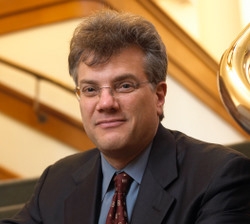Richard Pildes at the American Philosophical Society, on the state of voting rights
In a talk on the past and future of voting rights, part of an event moderated by Judge David Tatel of the US Court of Appeals for the District of Columbia Circuit, Richard Pildes, Sudler Family Professor of Constitutional Law, discussed “some of the most irrational features of our democratic system.”
Pildes’s November 15 discussion, during the American Philosophical Society’s autumn meeting in Philadelphia, focused on how the US designs its electoral institutions. “Some of the democratic ideals—participation, political equality, and the like—can and have had some perverse consequences for the actual functioning of our democratic institutions,” he said.
The practice of redesigning election districts every decade is flawed, Pildes argued, because the power to do so falls to “the most directly self-interested actors—sitting legislators.” Meanwhile, countries such as the UK long ago moved from that system to one in which independent commissions oversee electoral matters. Democracies created since World War II have largely followed suit.
“Why haven’t we developed these sorts of institutions ourselves?” asked Pildes, who went on to assert that it wasn’t simply because the legislators had a vested self-interest in keeping it that way.
“There’s also something about American democratic culture that resists taking parts of the electoral process like redistricting and putting them in the hands of independent kinds of institutions,” he said. “I think it reflects a kind of romanticization of the very idea of popular sovereignty. There is such skepticism within the unique democratic culture of the United States toward the idea that there could be independent institutions that the minute you start discussing these options, people make fun of that idea and fall back onto the view that at least, if this is done by politicians, they are somehow democratically accountable to us…. It’s a perversely self-defeating aspect of American democratic culture that makes our democracy worse in the name of democratic accountability and popular control, or at least the illusion of popular control.”
He also challenged the popular notion that gerrymandering is the sole culprit for “safe-seat” noncompetitive electoral districts, pointing out that Americans have increasingly sorted themselves out demographically in ways that cluster likeminded voters in particular locales. He also pointed to problematic aspects of racially based redistricting since the 1990s.
Pildes’s conclusion conveyed the dramatic sweep of his arguments. “I want to raise the questions for you about whether our democratic system is better off with popular control over the design of our political institutions, whether our admirable pursuit of antidiscrimination and political inclusion has viewed the issue of equality in too abstract a way, and whether if we think about real-world political power…we should be thinking about these abstract values through a lens that’s much more oriented toward the real institutional settings in which politics occurs.”
Posted on January 27, 2014


